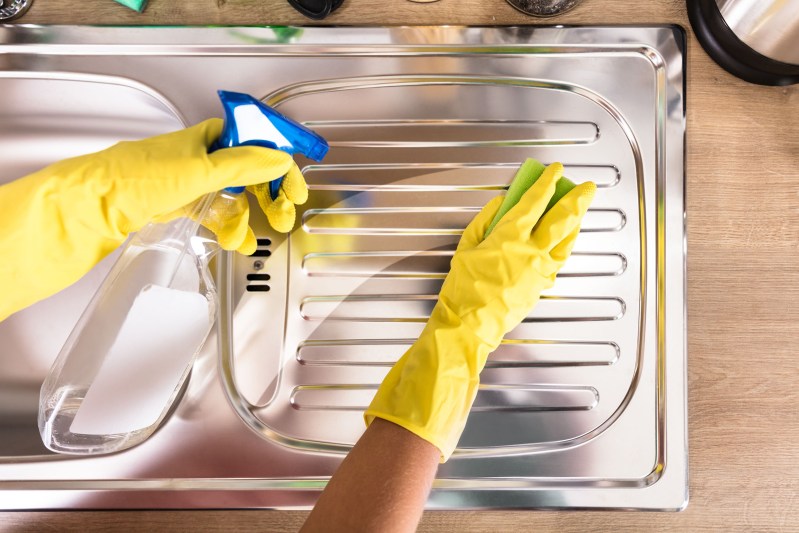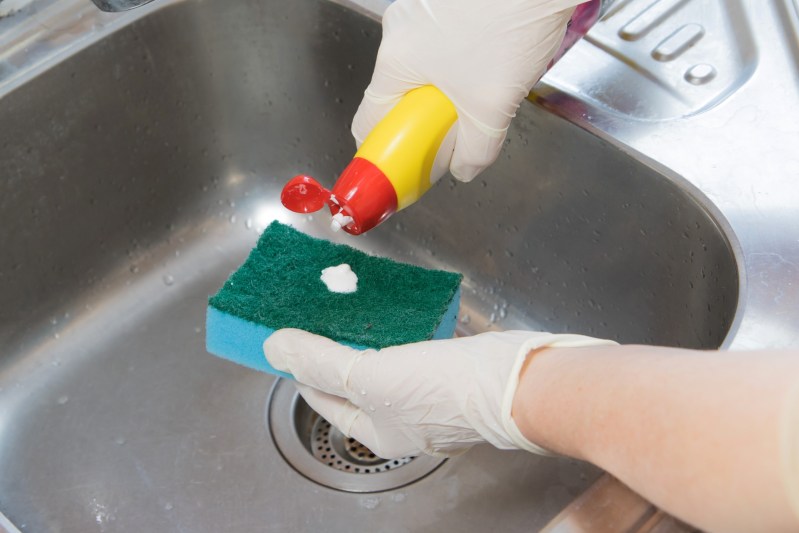Time and again, stainless steel kitchen sinks prove to be one of the most reliable, sleek, and modern additions to your kitchen. Whether you’re a novice home cook, a seasoned chef or you live by your favorite take-out spot, having a sink that’s easy to clean and disinfect can make or break your cooking experience. Like anything in your kitchen that’s used on the daily, your stainless steel appliances — whether that may be your oven racks, fridge doors or the kitchen sink — need a little love.
You can feel confident that a stainless steel sink will be affordable, durable, easy to maintain, and easy to clean. Without the proper care, stainless steel can lose its sleek and shiny appearance and develop some ugly water spots over time. With the right cleaning techniques, you can keep your sink looking polished and brand new, all year round.

How to Clean a Stainless Steel Sink with Cleaners
Commercial cleaning products are an easy way to keep your sink sparkling and germ-free, but not all cleaners are made the same. Some chemicals that can damage your stainless steel sink include solvents, chlorides, and acids. When in doubt, read the labels and ingredients in your products. This will help avoid unwanted reactions and permanent damage to your sink.
Popular stainless steel cleaning products come in a variety of presentations. You can purchase cleaning wipes, sprays, or powders that help you get the polishing job done in a matter of minutes.
Step 1: Start by grabbing a pair of gloves and a soft microfiber cloth
Step 2: Scrub in the direction of your sink’s polish lines to avoid scratching or damaging your stainless steel
Step 3: Rinse with clean hot water and dry the sink with a clean towel until your sink looks shiny and new

How to Clean a Stainless Steel Sink With Vinegar
Using common household products, you can give your sink a deep clean that’s effective, non-toxic, and ecological.
Pro Tip: Grab a soft cloth and some olive oil to give your sink that extra shine that stands out. A few drops of olive oil should be enough to buff the entire sink surface. This handy hack also creates a protective layer to keep the sink clean for longer periods of time. But don’t use olive oil on your sink handles, because that’ll make them slippery and greasy.
Step 1: Start by rinsing your sink with water from the faucet
Step 2: Then, coat the sink with a thin layer of baking soda. This will create a paste that you’ll scrub in the direction of the sink’s grain
Step 3: Spray the paste with vinegar and let it rest for 5 minutes
Step 4: As bubbles start to appear, you’ll know that those tough sink stains are dissolving.
Step 5: Rinse and repeat, as needed
Step 6: When you’re done polishing, remember to dry your sink with a clean towel
How to Clean a Black Stainless Steel Sink
If you have a black stainless steel sink, you’re a pretty swanky fella. This trendy twist on the traditional stainless steel delivers a striking look and an extra layer of protection for your sink. That’s because these sinks are easier to clean and prevent corrosion better than the traditional metal finish.
Step 1: Use a cloth and soapy water
Step 2: Avoid abrasive cleaners, household products, or other tools that will create permanent damage to your sink

Tips and Tricks to Clean a Stainless Steel Sink
Prevention is part of caring for your stainless steel sink. To avoid scratches, never clean your sink with steel wool or steel brushes. These will damage its surface and leave you with unsightly scratches on the sink.
While it may seem like a good idea to protect your sink with a rubber mat, they can lead to water accumulation and unattractive discoloration. A sink grid is a better alternative that allows water to evaporate and safeguards your sink from scratches. They’re especially helpful to protect black stainless steel sinks from scratches caused by silverware or jewelry.
- Start with a damp sponge and wipe down any leftovers on your sink
- Give your sink a quick rinse after every use
- Using a gentle cloth, polish in the same direction of your sink's finish
- Use a clean, dry towel to absorb water from the surface and prevent stains
Materials to Avoid on a Stainless Steel Sink
- Harsh soaps
- Chemical cleansers with chlorides
- Commercial products not formulated for stainless steel
- Steel wool pads or brushes
Routine cleaning ensures the durability of your sink and gently eliminates hard water stains without scratching. Whether you choose a soft abrasive cleaning product or make your own blend at home, a regular polish restores the shine of your sink and keeps it looking new.




